SGE utilizes generative AI technology to optimize and simplify the search process. Instead of searching multiple webpages for information, it provides concise overviews and summaries at the top of your search results.
If you’re planning a picnic with friends on a hot day, envision this as a new type of result
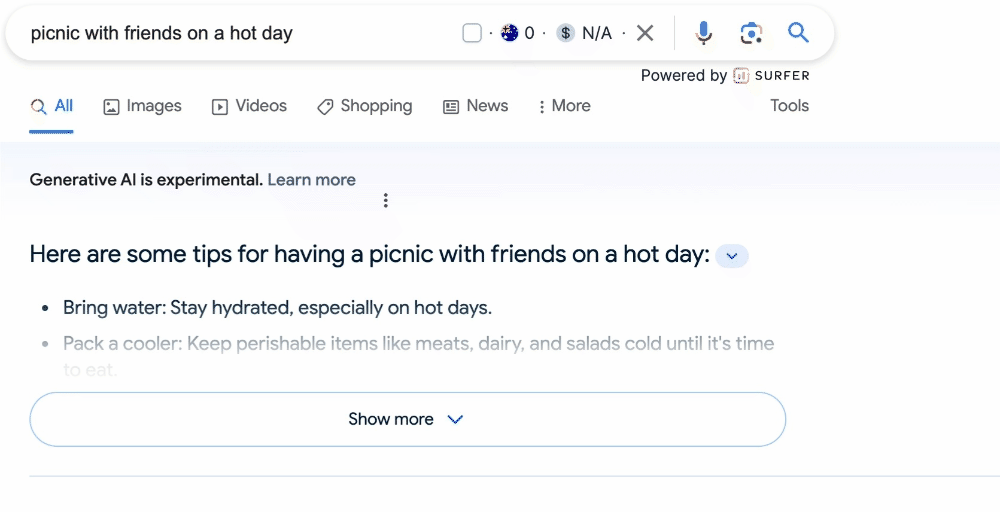
Google used to give you suggestions from various websites. But now, with SGE, it gives you a list of ideas directly in the search results.
This saves time and makes finding information much easier.
This method is a Swiss army knife for all your needs, whether it’s finding answers, getting a TL;DR of a topic, grasping the juicy bits, or even nailing those foolproof step-by-step instructions.
That’s the premise of this new search result experience, and has a big implication on organic search traffic for websites, so learning how it works and the ways to rank in SGE are absolutely necessary!
A guide to breaking down SGE and it’s implications for the future of search engine optimisation.
Get on Google SGE with this easy guide:
- Chrome Browser: Ensure you have the Chrome browser installed.
- Google Account: You should be logged into your Google account.
- Age Requirement: You need to be 18 years or older.
- Location: Google SGE must be available in your country. Currently, it’s accessible in over 120 countries.
Activating Google SGE:
- Open Chrome: Make sure you are signed into your Google account.
- Access Google: Open a new tab and visit the Google homepage.
- Find ‘Labs’ Icon: Look for the “Labs” icon at the top right. If you can’t find it in Search Labs, SGE might not be available in your region yet.
- Enable SGE: In the “Labs” section, find the “SGE, generative AI in Search” card and toggle it on.
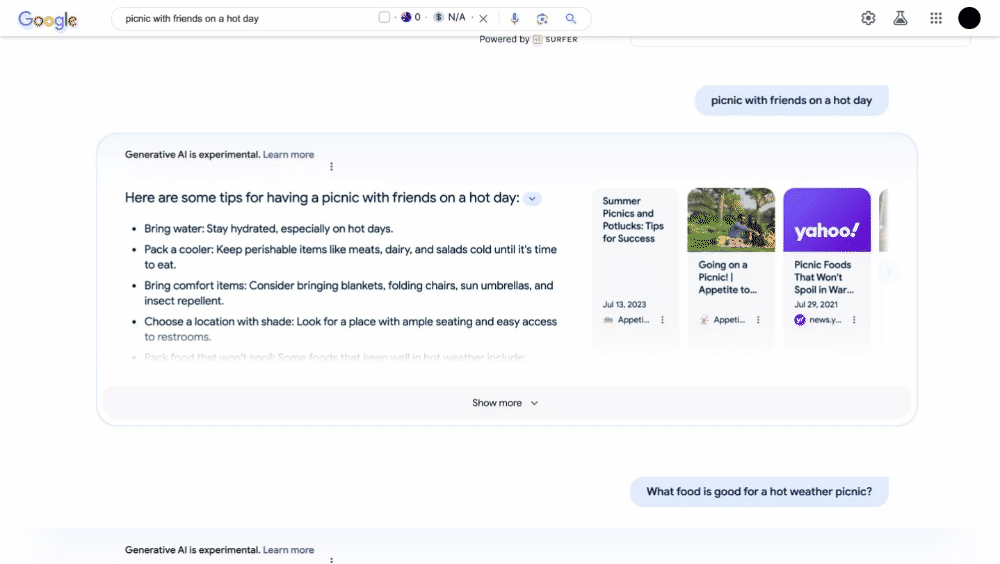
After these steps, you’re all set to experience AI-enhanced search results on some of your queries.
Remember, SGE doesn’t cover all search queries yet as it’s still an experimental feature, we’ll cover when it’s being released later on in this article to keep reading.
How SGE Works
At its core, generative AI involves algorithms or models capable of creating various forms of content, such as text, images, audio, and code. This technology powers many modern features.
How Google SGE works:
It uses an advanced LLM called PaLM 2, similar to GPT-4 used by Bing and ChatGPT. The models are trained on large data sets.
AI technologies like natural language processing (NLP), machine learning, and deep learning are used too. These features help Google understand, filter, and respond appropriately with an SGE result, mainly an AI snapshot that feels very similar to a featured snippet.
The AI snapshots are called a “starting point” for people to explore the search results. SGE provides links to resources for further research, these are the resources used to created the content featured within the result.
SGE in Action
Suppose you’re searching for “pizza dough recipe.” SGE would show three summarized recipes directly in your search results, giving you a quick comparison without visiting multiple websites.
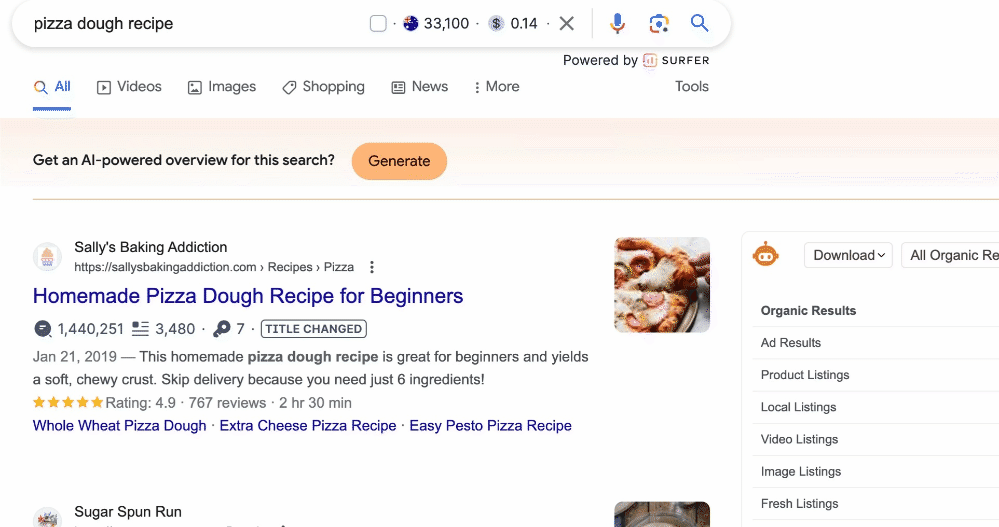
Follow-Up Feature:
SGE also recommends related questions. For instance, if you wonder about the best flour for pizza, clicking on SGE’s suggested question will give you a summary of the top cheese choices from different sources.
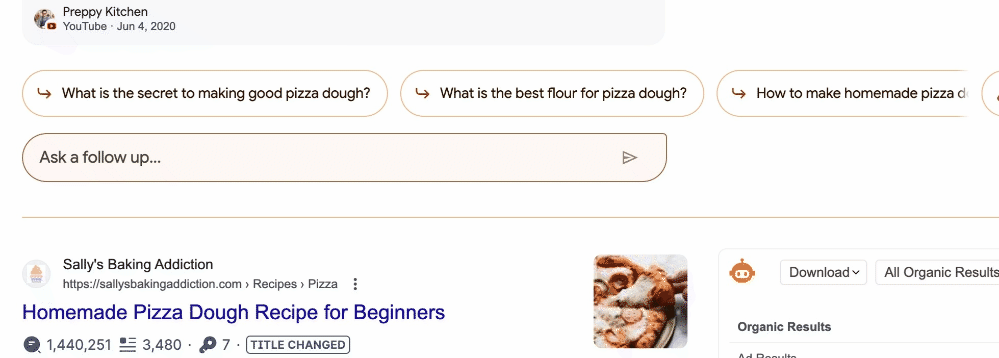
You can also inquire further. If you’re interested in gluten-free pizza options, just type your question, and SGE will present relevant tips and answers.
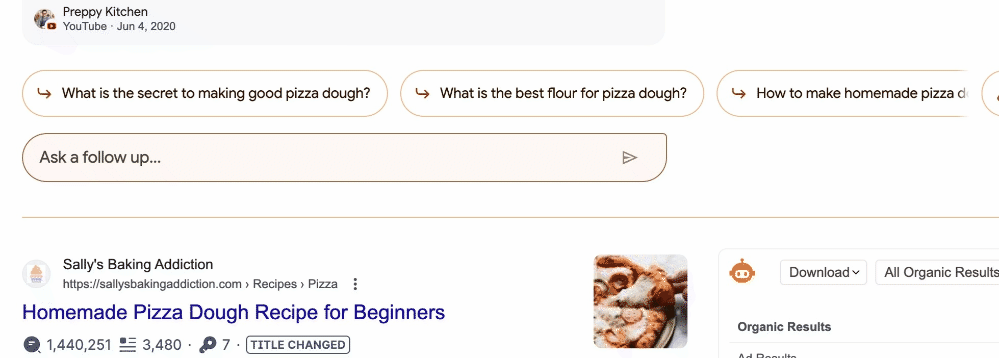
Understanding the Impact of SGE
Starting with everyday users, SGE is known for making the search process more innovative and user-friendly. Google notes that it’s especially popular among the younger crowd, those between 18 and 24 years old.
Simultaneously, TikTok’s surge in popularity highlights another aspect of this shift. In 2021, it became the most visited website, surpassing Google. This rise reflects changing search habits, particularly among young people.
According to Prabhakar Raghavan from Google, around 40% of young people in the U.S. use platforms like TikTok and Instagram to find top places to visit in a new country or a trending lunch spot, instead of using Google Maps or Search.
Insights from a Twitter survey show that Gen Z women prefers TikTok over Google for quick and relevant content.
Gen Z users can quickly identify false content and prefer brief videos for information, but are willing to read when needed.
Google is trying to compete with TikTok as they’re losing traffic to them!
Advantages of the Search Generative Experience
Here are the advantages of SGE:
1. Quick Answers
SGE provides quick and concise answers, making it like a supercharged featured snippet for fast information retrieval.
2. Extended Phrases
Unlike standard search results, SGE’s conversational mode allows users to extend their search phrases and ask follow-up questions while keeping the context intact. For example, if you’re searching for “how to bake blueberry muffins,” SGE suggests related queries like “variations of blueberry muffins” or “where to buy baking ingredients online.”
3. Handling Complex Queries
SGE is adept at understanding complex and even unclear questions in this more conversational mode of search, making it easier for users to get helpful responses.
4. Prompt Task Start
Users can dive into research, brainstorming, or visual references promptly with SGE. It provides suggested next steps and follow-up questions to keep the momentum going.
Disadvantages of the Search Generative Experience
Here are the downsides and limitations of SGE:
1. Inaccuracy of SGE Results
SGE results can sometimes be biased and inaccurate, reflecting web opinions and assumptions, especially on sensitive topics.
SGE search results may differ from other sources it cites, as it relies on multiple sources for information.
There are limitations in SGE’s ability to understand language, evaluate information quality, and generate coherent responses. Users should be aware of these limitations to manage their expectations and avoid frustration.
2. Big Change in SERP (Search Engine Result Page)
SGE has had a significant impact on the SERP, leading to a decline in the visibility of paid and organic results.
As you can see the changes in the top 10 search results, the SGE snippet takes up a majority of the first scroll.

Pages that rank in the normal 1 – 10 positions potentially have no opportunity to be clicked.
Even featured snippets, designed for easy access to highlighted text, have been affected, making it challenging for websites to gain organic search engine traffic.
3. Less Visibility for Paid Search
Google’s control over SERPs also impacts paid advertising, a major revenue source for many companies.
Companies must be cautious to ensure that SGE doesn’t negatively affect their search advertising efforts.
Google is experimenting with generative AI ads, testing placements and formats that integrate well with search results.
What can you start doing now to prepare for SGE?
Let’s quickly break down how to rank in the SGE result:
- Build Your Brand: This means making your website and content trustworthy and authoritative. Keep your website neat and user-friendly. Create content that is informative and engaging. Also, getting links from other reputable websites to your site (backlinks) is crucial.
- Learn about Generative Engine Optimization: This is a set of techniques designed to enhance the visibility of web content in generative search engine responses. By incorporating strategies such as adding relevant statistics, credible quotations, and authoritative citations.
- In-Depth Keyword Research: Spend time finding the right keywords, especially the longer, specific ones (long-tail keywords). Understand the type of information people are looking for when they use these keywords (SERP intent). This helps match your content with what people are searching for in a conversational way.
- New Age Content Optimization: Focus on creating engaging, clear, and conversational content that stands out with its unique and helpful information, and consider including diverse formats like lists and videos; this is geared toward what SGE wants to see.
When will SGE be released live?
Google hasn’t announced the exact date for the full rollout of SGE. According to Barry Schwartz from Search Labs, the SGE experiment was expected to end in December 2023.
Beyond that, there are only vague statements and rumours on when exactly, for example, in India, the experience ends in February 2024
Barry Schwartz has noted that they’ve removed the reference to the end date for SGE.
My theory is that they’ve extended the testing period unofficially in select searches as we see frequent changes to featured snippet types across 2024 and won’t commit to a full rollout; only parts of the SGE we’ve seen until now will be in the final version for the public.
Conclusion
Google’s SGE (Search Generative Engine) is transforming search by using generative AI to provide quick answers and summaries directly in search results, saving time and simplifying information retrieval.
SGE is reshaping search habits, especially among younger users who prefer quick content. However, it’s important to be aware of its potential inaccuracies and impact on the Search Engine Result Page (SERP).
To prepare for SGE’s influence on SEO, focus on building a trustworthy brand, learning about Generative Engine Optimization (GEO), conducting keyword research, and optimizing content for conversational search.
As search evolves, staying informed and adapting your SEO strategies will be essential in the age of SGE.


